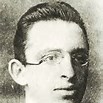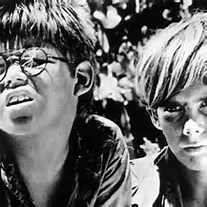
What Makes Them Do IT?
When I was in high school, a friend of mine presented me with a copy of Friedrich Nietzsche’s Thus Spake Zarathustra. “You’re the only person I know who would actually read this,” she said to me laughing. And I did read it. I even took notes. In the spirit of her confidence in my love affair with books, I have recently been working my way through the back list of The New York Review of Books. I’ve read some great things in the process: Elizabeth Hardwick’s New York short stories, Richard Hughes’ High Wind in Jamaica (I remember watching the 1967 movie, with Anthony Quinn and James Coburn, as a child), and most recently, the kind of book that would easily have fallen into my high school friend’s category of weird enough that only someone like me would read it, Alexander Berkman’s Prison Memoirs of an Anarchist.
Never heard of it? Let me tell you about it.
Alexander Berkman became a very famous fellow in America in 1892, or perhaps we should say infamous. He was an Anarchist, a person who hated “capitalists,” a person who found even Socialists too conservative for his taste. In 1888, Berkman brought this Anarchism to America from his native Lithuania in Tsarist Russia where the population was oppressed and where intellectuals like Berkman had evolved extreme political views to counter this oppression.
Let me tell you about the Russian Anarchists. They were big on assassinations. They had killed the Tsar in 1881 by throwing a bomb at his feet on a St. Petersburg street. The Tsar wasn’t the only one killed from this bomb. The scene of the royal assassination apparently looked like something we have all grown far too familiar with on the evening news these days: a Baghdad market, an Israeli café, a Boston sidewalk, pools of blood, lifeless bodies, dazed or wailing survivors.
In July of 1892, Alexander Berkman traveled from New York to Pittsburgh to assassinate Henry Clay Frick, the man Andrew Carnegie of Carnegie Steel had tasked with breaking the back of the union at Carnegie’s factory in Homestead, Pennsylvania.
Berkman got into Frick’s Pittsburgh office, shot and stabbed, but failed to kill him. He was eventually wrestled to the ground, dragged off to jail, stood trial and was convicted to twenty-two years in prison, fourteen of which he served. Prison Memoirs of an Anarchist is the book he wrote about these fourteen years in a Pennsylvania prison. It is both a political tract expressing his views of the righteousness of assassination (which he did not consider murder), and a very moving human account of what it was like to be a young man locked up in a brutal American prison in the early 1880’s.
Here’s the thing. You know what he did, but you still like him, or perhaps I should say you don’t dislike him. Despite his cold-blooded attempt to kill a man, in his memoirs Berkman actually comes across as an innocent, a rather soft, idealistic young man brought hard up against the cruel imperatives of prison life. You can connect with his humanity. You can feel the hopelessness of his plight, trapped in an airless cell, repeatedly dragged down into the “dungeon” for trumped up offenses, forced to drink coffee made from burnt bread crusts and eat stew from which the guards had stolen all the meat for themselves. You can understand his despair at the inhumanity of the prison system toward him as well as his fellow prisoners.
The book, despite much of its nineteenth century political bombast, feels very modern. And why not? Fanatical young men with extreme views have not gone away. In fact, they seemed to have multiplied quite recently.
We all watched the image of a black clad man with a British accent standing over the American in orange who knelt before him on the desert sand his face full of knowledge and hopelessness. We gazed in horror at what looked like a small kitchen knife in the hand of the man wrapped in black and reflected (or I did) that the medieval executioner’s sinister, curving, two-pointed ax or the French guillotine seemed quite humane (or at least hugely preferable) in comparison. We asked ourselves how the man in black could do it. What was wrong with him? We didn’t and don’t understand.
What attracts a person to an extreme and violent ideology?
Simple answers. The desire to be a hero, to be part of something greater than yourself.
What drives him there?
Poverty, lack of education, an intolerable life . . . boredom.
In Alexander Berkman’s case, it was a mix of the above. He became an Anarchist already in his teens, (and was only twenty-two when he shot Frick) a time of life when simple answers to complex questions still seem possible. He was well-to-do and well-educated, but the yoke of the Tsarist system was heavy on everyone, in particular on the intelligent and well-educated. An uncle involved in politics had been killed by the Tsarist police. When Berkman immigrated to America in 1888, he saw the excesses of the age of robber baron capitalism. A handful of wealthy American industrialists lived opulently, like Tsars, while their employees, many of them immigrants, toiled in unspeakable conditions in the factories and went home to equally unspeakable conditions in the city tenements.
Alexander Berkman and his fellow Anarchists thought assassinations would change this. He was wrong of course. Reform changed it, laws that were slow in coming and imperfect when they did come but which weren’t predicated on death and destruction, on murder.
Reform. What adults do. Whose complexity is maddening and the pursuit of which requires infinite patience and the ability to compromise, but which is the only thing that lasts. Not murder, not vengeance, not the taking of hostages.
Reform. A place where time slows, where the minutes seem like hours, the hours like days. A place where there are no absolutes. A place of frustration, of dreams deferred.
A place without clear heroes. Without battle cries, or slaughter.
No country, it seems, for young men.





As usual, great insight Linda…
Yes,reform, the great movement we are all a part of. Patience is not an attribute of the young and as I am discovering of the older generation either.
Thanks for your insight.